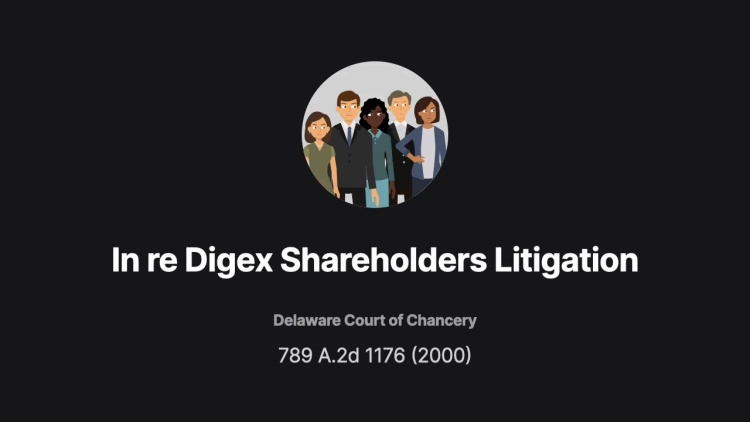In re Digex Shareholders Litigation
Delaware Court of Chancery
789 A.2d 1176 (2000)
- Written by Sharon Feldman, JD
Facts
WorldCom, Inc. (defendant) entered into a merger agreement with Intermedia Communications, Inc. (Intermedia) (defendant). Intermedia was the controlling shareholder of Digex, Inc. (defendant). After the merger, WorldCom would possess over 85 percent of Digex’s voting power but under 85 percent of Digex’s outstanding voting shares. Four members of the Digex board of directors were affiliated with Intermedia. The four Intermedia-affiliated board members voted to waive the protections of § 203 of the Delaware General Corporation Law (DGCL). Three independent directors advised the board against waiving § 203 protections and voted against the waiver. Absent the waiver, § 203 would prevent WorldCom from engaging in a business combination with Digex for three years after the WorldCom–Intermedia merger unless WorldCom owned at least 85 percent of Digex’s voting stock. The lawyers who advised the parties disagreed as to whether the 85 percent exception referred to WorldCom’s Digex voting power or the number of shares WorldCom held as a percentage of Digex’s outstanding shares. Digex’s minority shareholders (plaintiffs) moved to preliminarily enjoin the merger or the § 203 waiver, claiming that the four interested Digex directors breached their fiduciary duty by voting to waive § 203’s protections. WorldCom, Intermedia, and Digex argued that even if the waiver was invalid, WorldCom would be exempt from § 203 because it would possess over 85 percent of Digex voting power after the merger and the waiver was fair to Digex shareholders.
Rule of Law
Issue
Holding and Reasoning (Chandler, J.)
What to do next…
Here's why 907,000 law students have relied on our case briefs:
- Written by law professors and practitioners, not other law students. 47,100 briefs, keyed to 996 casebooks. Top-notch customer support.
- The right amount of information, includes the facts, issues, rule of law, holding and reasoning, and any concurrences and dissents.
- Access in your classes, works on your mobile and tablet. Massive library of related video lessons and high quality multiple-choice questions.
- Easy to use, uniform format for every case brief. Written in plain English, not in legalese. Our briefs summarize and simplify; they don’t just repeat the court’s language.





